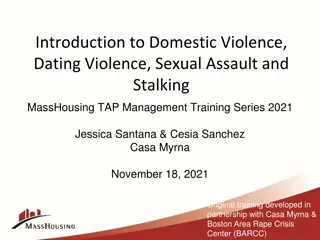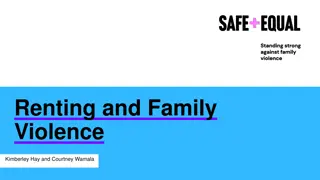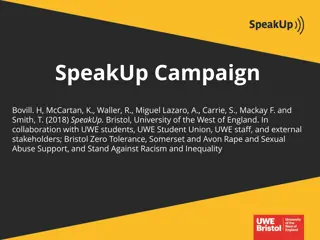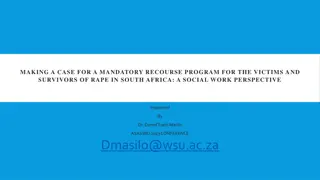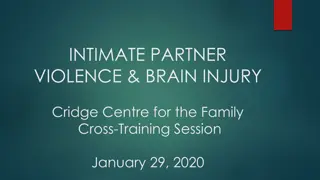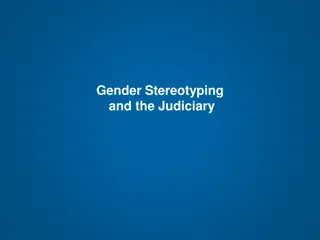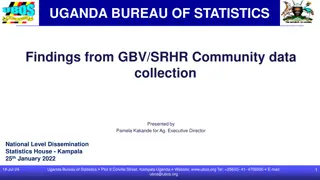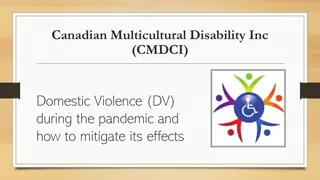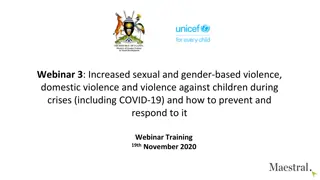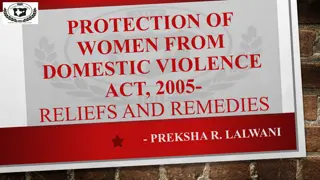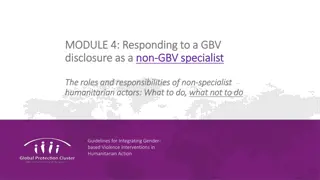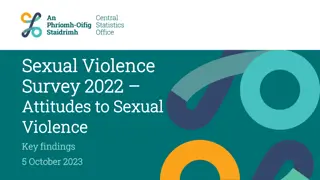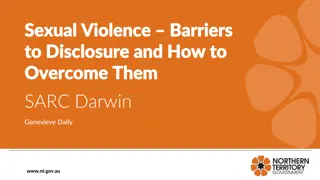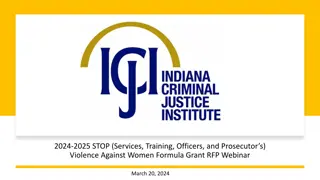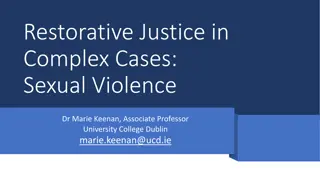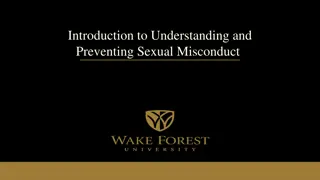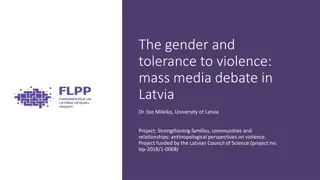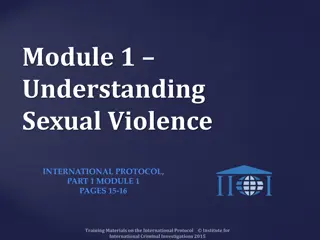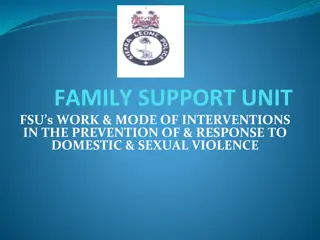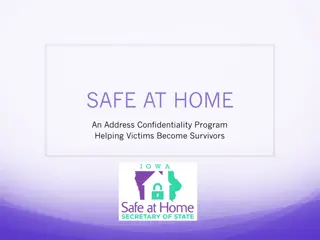Challenges in Accessing Justice for Survivors of Sexual Violence and Disabilities
Sexual violence against individuals with disabilities is underreported due to barriers in justice access. Gender stereotypes, discriminatory practices, and lack of support services further hinder justice for survivors. Identifying and monitoring women and girls with disabilities at risk poses challenges, especially in institutional settings where power imbalances exacerbate the risk of abuse. Patriarchal attitudes and discriminatory perceptions impede progress in addressing the issue effectively.
Download Presentation

Please find below an Image/Link to download the presentation.
The content on the website is provided AS IS for your information and personal use only. It may not be sold, licensed, or shared on other websites without obtaining consent from the author.If you encounter any issues during the download, it is possible that the publisher has removed the file from their server.
You are allowed to download the files provided on this website for personal or commercial use, subject to the condition that they are used lawfully. All files are the property of their respective owners.
The content on the website is provided AS IS for your information and personal use only. It may not be sold, licensed, or shared on other websites without obtaining consent from the author.
E N D
Presentation Transcript
Sexual Violence And Disability: Law, Practice And Access To Justice Dariana Gryaznova Eurasia Legal Advisor Equality Now https://equalitynow.org/
Equality Nows Work Formats Reports Sexual Violence And Disability In Kyrgyzstan: Law, Policy, Practice And Access To Justice (2023) Navigating The Justice System As A Sexual Violence Survivor With Disabilities (online webpage) Sexual Violence Against Women and Girls with Disabilities in Central Asia (upcoming) Submissions to Regional and International Human Rights Mechanisms CAT, CCPR, CEDAW, CRPD, CRC, CSW, EU Human Rights Dialogues, UPR Strategic Litigation
Barriers to Access to Justice in SV Cases Sexual violence remains significantly underreported There is a lack of a consent-based definition of rape Burdensome and discriminatory evidentiary standards continue to persist Survivors face a severe lack of support services Deeply entrenched patriarchal attitudes, gender stereotypes, disbelief, and humiliation from law enforcement and forensic experts, as well as victim-blaming by relatives and communities, leave the overwhelming majority of sexual violence crimes unpunished If the survivor has a disability, these barriers are further compounded, making access to justice and support even more challenging
Lack of Mechanisms to Identify and Monitor Women and Girls with Disabilities at Risk There is a lack of an effective system to identify, monitor, and assist women and girls with disabilities who are at risk of, or experiencing, gender-based violence, particularly sexual violence Women and girls in psychiatric and psychoneurological institutions, social care homes, and other residential facilities face a heightened risk of sexual violence, compounded by significant barriers to reporting abuse due to institutional power imbalances and the absence of supportive procedures
Gender Stereotypes Against Women and Girls with Disabilities Patriarchal Attitudes Among Law Enforcement and Judicial Officials Discriminatory Perceptions, including: Beliefs that women with disabilities are more likely to lie or fantasize. Recorded comments such as: Who would want to have sex with a woman with a disability? Be thankful he paid attention to you. Who else would have looked at you?
Burdensome and Discriminatory Evidentiary Standards In the overwhelming majority of cases, sexual violence crimes are prosecuted only when physical injuries are found on the body of the victim, as well as biological materials associated with a sexual act Approaches which directly contradict Article 12 of the CRPD still persist
Mandatory Appointment of Psychiatric/ Psychological Expert Examination
Our Key Recommendations Amend the definition of rape so that it is based on the lack of genuine and voluntary consent, and put in place victim-centred guidelines on how consent should be understood, including in relation to survivors with disabilities Put in place comprehensive manuals and guidelines for criminal justice professionals, in line with CRPD and CEDAW standards, and provide trainings for law enforcement and the judiciary to effectively respond to and address sexual violence against women and girls with disabilities Establish victim-centred support services and provide reasonable and procedural accommodation for women and girls survivors of sexual violence during criminal justice processes
Our Key Recommendations (2) Remove burdensome evidentiary standards and abolish discriminatory provisions preventing women and girls with disabilities from testifying Collect and analyze administrative data on sexual violence disaggregated by sex, age, disability and other characteristics Develop and adopt a comprehensive strategy at the level of the Government to overcome negative gender and disability stereotypes and harmful practices and build zero tolerance for all types of violence in order to achieve gender equality
How? Advocating for Domestic Legal Reforms Advocating for Changes in Practice Effectively Investigating, Prosecuting and Adjudicating Sexual Violence Cases with a Particular Focus on Survivors with Disabilities: A Manual for Practitioners in Kyrgyzstan (ongoing work) A manual for lawyers representing women and girls in sexual violence cases, with a special focus on survivors with disabilities (ongoing work) Contributing to Global Change Expert meeting to address violence against women with disabilities (September 2024, Serbia) A joint letter to the CEDAW Committee proposing a General Recommendation on access to justice for women, adolescents, and girls with disabilities (April 2024)
Thank you! dgryaznova@equalitynow.org


